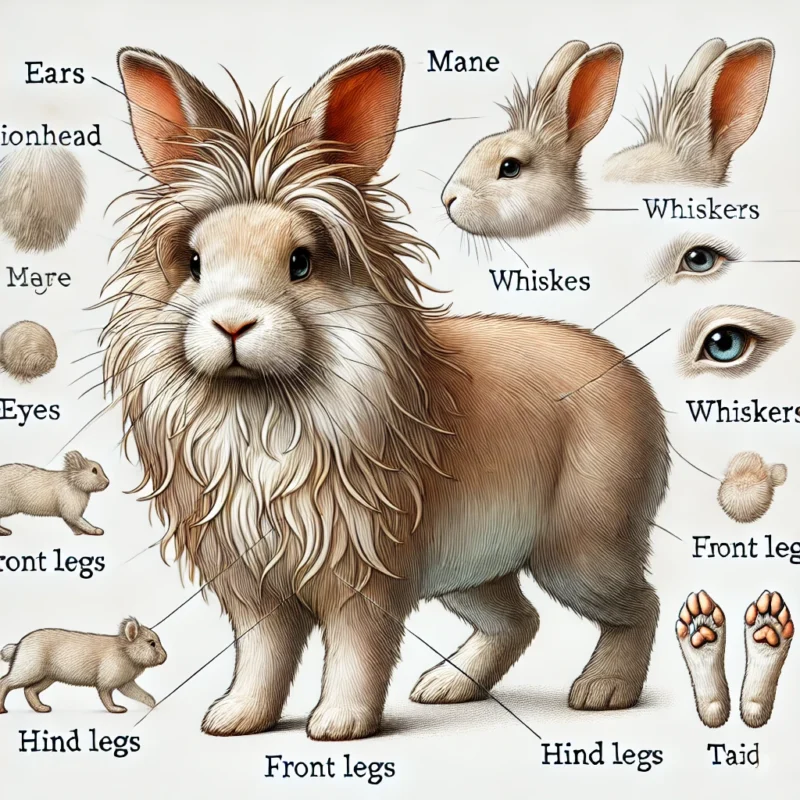Lionhead rabbits are not just adorable balls of fluff but also incredibly social creatures. With their distinctive lion-like mane and playful personalities, these bunnies make wonderful companions for families, singles, and even seniors.
But to truly enjoy the company of a Lionhead rabbit, it’s essential to understand their social behavior. This guide will teach you everything you need to know about how these rabbits interact, bond, and thrive in a social environment.
- Why Are Lionhead Rabbits So Social?
- Baby Lionhead Rabbit Social Behavior:
- Lionhead Rabbit Social Behavior with Humans:
- Lionhead Rabbit Social Behavior with Other Rabbits:
- How to Build a Strong Bond with Your Lionhead Rabbit:
- Common Social Behavior Problems and Solutions:
- Why You Should Adopt a Lionhead Rabbit:
- Final Thoughts:
- Frequently Asked Questions:
Why Are Lionhead Rabbits So Social?
Lionhead rabbits are known for their friendly and outgoing nature. Unlike some other rabbit breeds, they thrive on interaction—whether with humans or other rabbits. This social behavior stems from their origins as prey animals in the wild, where living in groups provided safety and companionship.

Key Traits of Lionhead Rabbit Social Behavior:
- Playful and energetic: They love to explore, hop around, and play with toys.
- Affectionate: Many Lionheads enjoy cuddling and being petted once they trust you.
- Curious: They are naturally inquisitive and love to investigate their surroundings.
- Bonding-oriented: They form strong bonds with their owners and other rabbits.
Baby Lionhead Rabbit Social Behavior:
Understanding baby Lionhead rabbit social behaviour is crucial if you’re raising a young bunny. Baby Lionheads, also called kits, are highly social from a young age. They rely on their mother and siblings for warmth and comfort and learn social cues.
Key Points About Baby Lionhead Rabbit Social Behavior:
- Early Socialization: Kits start interacting with their littermates as early as two weeks old, learning important social skills like grooming and play-fighting.
- Bonding with Humans: Baby Lionheads can begin forming bonds with humans as early as four weeks old. Gentle handling and positive reinforcement are key.
- Playfulness: Kits are incredibly playful and curious, making this the perfect time to introduce toys and safe exploration.
Pro Tip: If you are adopting a baby Lionhead, ensure it stays with its mother until it is at least eight weeks old to learn proper social behaviour.

Lionhead Rabbit Social Behavior with Humans:
One of the most rewarding aspects of owning a Lionhead rabbit is their ability to form deep bonds with humans. Their social behaviour with humans is characterized by affection, trust, and a desire for interaction.
How to Strengthen Your Bond with Your Lionhead Rabbit:
- Spend Quality Time Together: Dedicate at least 30 minutes daily to interact with your rabbit. Sit near them, whisper, and let them approach you.
- Offer Treats: Use healthy treats like fresh veggies to reward positive behaviour and build trust.
- Learn Their Preferences: Some Lionheads love being petted, while others prefer playing. Pay attention to what your rabbit enjoys most.
Anecdote: My Lionhead, Max, loves sitting on my lap while I read. At first, he was hesitant, but now he hops over as soon as he sees me with a book!
Lionhead Rabbit Social Behavior with Other Rabbits:
Lionhead rabbits are highly social animals that thrive in the company of other rabbits. Their social behaviour with other rabbits is fascinating to observe and essential for their well-being.
Benefits of Rabbit Companionship:
- Emotional Support: Rabbits groom each other, play together, and provide comfort.
- Reduced Loneliness: A companion can help your rabbit feel more secure and happy.
- Improved Behavior: Rabbits with companions are less likely to exhibit destructive behaviors.
How to Introduce Two Rabbits:
- Neutral Territory: Introduce them in a space neither rabbit has claimed.
- Supervised Meetings: Allow them to interact for short periods, gradually increasing the time.
- Watch for Bonding Signs: Grooming, cuddling, and sharing food are positive signs.
Note: Always spay or neuter rabbits before introducing them to prevent territorial aggression.

How to Build a Strong Bond with Your Lionhead Rabbit:
Building a bond with your Lionhead rabbit takes time, patience, and understanding. Here’s a step-by-step guide to help you create a lasting friendship with your fluffy companion:
Step 1: Create a Safe and Comfortable Environment:
Before you can bond with your rabbit, you need to ensure they feel safe in their new home. A spacious enclosure with plenty of room to hop around is essential. Include hiding spots, toys, and a cozy area for resting.
Pro Tip: Place the enclosure in a quiet area of your home where your rabbit can observe family activities without feeling overwhelmed.
Step 2: Spend Time Together Daily:
Lionhead rabbits thrive on attention. Spend at least 30 minutes to an hour each day interacting with your bunny. Sit near their enclosure, talk softly, and let them come to you. Avoid forcing interaction, as this can make them feel threatened.
Step 3: Use Positive Reinforcement:
Reward your rabbit’s good behaviour with treats, gentle petting, or verbal praise. This act helps them associate you with positive experiences.
Recommended Treats: Fresh veggies like carrots, parsley, or small pieces of apple (in moderation).
Step 4: Learn Their Body Language:
Understanding your rabbit’s body language is key to building trust. For example:
- Ears forward: They are curious or excited.
- Thumping hind legs: They are scared or warning of danger.
- Licking or nudging: They are showing affection.
By responding appropriately to their signals, you’ll strengthen your bond.
Step 5: Introduce Playtime:
Lionhead rabbits are playful by nature. Provide toys like tunnels, balls, and chew toys to keep them entertained. You can also join in the fun by gently tossing a toy or playing hide-and-seek.
Pro Tip: Rotate toys regularly to keep your rabbit engaged and prevent boredom.

Common Social Behavior Problems and Solutions:
Even the most social Lionhead rabbits can experience behavioural issues. Here’s how to address common problems:
Problem 1: Aggression:
Aggression in rabbits can stem from fear, territorial behaviour, or hormonal changes.
Solution:
- Spay or neuter your rabbit to reduce hormonal aggression.
- Provide plenty of space and resources to prevent territorial disputes.
Problem 2: Shyness:
Some Lionheads are naturally more timid and may take longer to warm up to you.
Solution:
- Be patient and avoid sudden movements.
- Offer treats and speak softly to build trust.
Problem 3: Destructive Behavior:
Bored or lonely rabbits may chew on furniture or dig excessively.
Solution:
- Provide plenty of toys and enrichment activities.
- Spend more time interacting with your rabbit.
Why You Should Adopt a Lionhead Rabbit:
If you consider adding a Lionhead rabbit to your family, you are in for a treat. These bunnies are not only adorable but also incredibly rewarding pets. Their social nature makes them perfect for families, singles, and even seniors looking for a furry companion.
Reasons to Adopt a Lionhead Rabbit:
- Affectionate and playful: They’ll keep you entertained with their antics.
- Low-maintenance: Compared to dogs, rabbits require less daily care.
- Long lifespan: With proper care, Lionheads can live 7–10 years.

Final Thoughts:
Understanding and nurturing your Lionhead rabbit’s social behaviour is the key to a happy and healthy relationship. By providing a safe environment, spending quality time together, and respecting their unique personality, you’ll create a bond that lasts a lifetime.
Ready to bring home your Lionhead rabbit? Visit Petfinder or your local animal shelter to find your perfect match. With love, patience, and a little effort, you’ll soon have a fluffy friend who fills your life with joy and laughter.
Frequently Asked Questions:
Are Lionhead Rabbits Social?
Yes, Lionhead rabbits are highly social animals. They thrive on interaction and companionship, whether it’s with humans or other rabbits. In the wild, rabbits live in groups for safety and socialization, and this instinct carries over to domesticated Lionhead rabbits.
They enjoy playing, grooming, and cuddling with their companions. If you’re considering adopting a Lionhead, be prepared to spend quality time with them daily to meet their social needs.
Do Lionheads Like to Be Held?
While Lionhead rabbits are affectionate and enjoy human interaction, not all of them like to be held. Rabbits are prey animals by nature, and being picked up can make them feel vulnerable. However, many Lionheads will tolerate or even enjoy being held if they trust their owner and feel secure.
Tips for Holding Your Lionhead Rabbit:
- Build Trust First: Spend time bonding with your rabbit before attempting to pick them up.
- Support Their Body: Always support their hind legs and back to make them feel safe.
- Keep It Short: Limit holding sessions to a few minutes at a time.
- Watch for Signs of Stress: If your rabbit struggles or thumps their hind legs, put them down gently.
Some Lionheads may prefer sitting next to you or hopping onto your lap rather than being held. Respect their preferences to strengthen your bond.
What Is the Behavior of a Lionhead Rabbit?
Lionhead rabbits are known for their unique and endearing behaviors. Here’s a breakdown of their typical behavior:
1. Playful and Energetic:
Lionheads love to explore, hop around, and play with toys. They enjoy activities like digging, chewing, and running through tunnels.
2. Affectionate and Curious:
These rabbits are naturally inquisitive and often form strong bonds with their owners. They may nudge you for attention, lick your hand, or follow you around the room.
3. Social and Bonding-Oriented:
Lionheads thrive in the company of other rabbits or humans. They enjoy grooming their companions and cuddling together.
4. Communicative:
Rabbits use body language to express themselves. For example:
- Binkying (jumping and twisting): A sign of happiness.
- Thumping hind legs: A warning or sign of fear.
- Licking or nudging: A display of affection.
5. Intelligent and Trainable:
Lionheads are smart and can learn tricks, respond to their name, and even be litter-trained.
6. Territorial at Times:
Unspayed or unneutered rabbits may exhibit territorial behavior, such as marking their space or showing aggression. Spaying or neutering can help reduce these tendencies.







